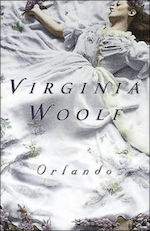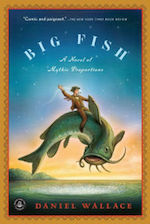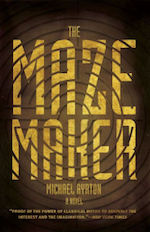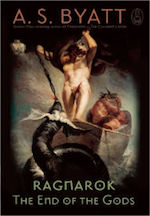Please enjoy this encore post about fantasy books that aren’t thought of as fantasy, originally published on August 2016.
One of my guilty pleasures is wandering through the “literature” section of bookstores, opening and closing books, in search of fantasy and science fiction. There’s more of it to be found than you’d expect. Some, like T. H. White’s The Once and Future King, are there because they predate the existence of commercial fantasy. Others, like Margaret Atwood’s The Handmaid’s Tale, are shelved where she made her reputation in the first place. Most, however, are present simply because even the most earthbound writers occasionally like to expand their imaginations to the utmost, to the places on the map marked Here Be Dragons, and that’s where fantasy dwells.
The fantasy section of bookstores exists for our convenience, but it pays to wander outside of it every now and then.
Here are five fantasy books you won’t find in the fantasy section.
Orlando by Virginia Woolf
 Virginia Woolf was the most magisterial of the Modernists and the least afraid to write about domestic life. So it astonished her contemporaries when she wrote a lighthearted account of a moody young Elizabethan poet-manque who lives, unaging, into the Twentieth Century, turning into a woman along the way. As historical fantasy it rocks—the description of the ice fair on the frozen Thames (an actual event, incidentally) is enchanting—but ultimately, it’s a prescient study of gender and identity.
Virginia Woolf was the most magisterial of the Modernists and the least afraid to write about domestic life. So it astonished her contemporaries when she wrote a lighthearted account of a moody young Elizabethan poet-manque who lives, unaging, into the Twentieth Century, turning into a woman along the way. As historical fantasy it rocks—the description of the ice fair on the frozen Thames (an actual event, incidentally) is enchanting—but ultimately, it’s a prescient study of gender and identity.
But whoever said fantasy can’t be serious?
Big Fish: A Novel of Mythic Proportions by Daniel Wallace
 Edward Bloom, traveling salesman and absentee father, is dying and his son desperately wants to connect with and understand him. But the old man is a compulsive storyteller, and the entire book is told in the voice of the American tall tale. Wonderfully unreliable incidents involving a giant, a two-headed geisha, a magical glass eye, an underwater town, and of course a tremendous catfish overwhelm the inherent sadness of an old man’s death, and ultimately the facts must bow before the superiority of a good lie well told.
Edward Bloom, traveling salesman and absentee father, is dying and his son desperately wants to connect with and understand him. But the old man is a compulsive storyteller, and the entire book is told in the voice of the American tall tale. Wonderfully unreliable incidents involving a giant, a two-headed geisha, a magical glass eye, an underwater town, and of course a tremendous catfish overwhelm the inherent sadness of an old man’s death, and ultimately the facts must bow before the superiority of a good lie well told.
Big Fish was made into a movie which I could watch with pleasure every day of the week but the novel is much, much better.
The Maze Maker by Michael Ayrton
 The Maze Maker sets out to be one of those novels where a mythic figure—here, Daedalus, creator of both the labyrinth and the wings that doomed his son Icarus—is rationalized as a historic figure, and it does include a great deal of fascinating Bronze Age smithery. But while the plot satisfies our expectations, its inherent weirdness keeps bursting out. The Goddess appears to Daedalus in the form of a double-ax. Icarus flies up to the Sun, his body undergoing Lorenz-Fitzgerald contractions. Daedalus is smashed to the earth and when an ant crawls into his ear and begins to traverse the labyrinthine folds of his brain, he names the ant “Daedalus.”
The Maze Maker sets out to be one of those novels where a mythic figure—here, Daedalus, creator of both the labyrinth and the wings that doomed his son Icarus—is rationalized as a historic figure, and it does include a great deal of fascinating Bronze Age smithery. But while the plot satisfies our expectations, its inherent weirdness keeps bursting out. The Goddess appears to Daedalus in the form of a double-ax. Icarus flies up to the Sun, his body undergoing Lorenz-Fitzgerald contractions. Daedalus is smashed to the earth and when an ant crawls into his ear and begins to traverse the labyrinthine folds of his brain, he names the ant “Daedalus.”
Ayrton was a sculptor who once created a golden honeycomb for the estate of Sir Edmund Hillary, the first to reach the summit of Everest. Bees filled the sculpture with honey and larvae. The Maze Maker is the novel such a man would write.
Ragnarok by A. S. Byatt
 Commissioned to rework a myth in novella form, Byatt chose to concentrate on a “thin child” in WWII Britain who knows her RAF pilot father will not return from the war. The girl (Byatt herself) discovers a book on the Norse gods, whose vivid, terrifying stories have much greater application to what feels like the end of the world than do those of the kindly god she hears in church. Ragnarok is full of invention, Rándrasill, the undersea mega-kelp equivalent of Yggdrasil, the World-Tree, being a particularly brilliant example. Byatt also provides unexpected insights into the original myths. She points out, for example, that Loki can change shape when none of the other gods can, and then draws a moving portrait of his strange yet loving relationship with his daughter, the world-serpent.
Commissioned to rework a myth in novella form, Byatt chose to concentrate on a “thin child” in WWII Britain who knows her RAF pilot father will not return from the war. The girl (Byatt herself) discovers a book on the Norse gods, whose vivid, terrifying stories have much greater application to what feels like the end of the world than do those of the kindly god she hears in church. Ragnarok is full of invention, Rándrasill, the undersea mega-kelp equivalent of Yggdrasil, the World-Tree, being a particularly brilliant example. Byatt also provides unexpected insights into the original myths. She points out, for example, that Loki can change shape when none of the other gods can, and then draws a moving portrait of his strange yet loving relationship with his daughter, the world-serpent.
In addition to everything else, Ragnarok serves as a lovely introduction to Byatt’s longer works.
Chimera by John Barth
 This book contains three novellas, all fabulous in both senses of the word. The best of them is Dunyazadiad, a postmodern “maximalist” look at the Arabian Nights through the lens of Sheherezade’s little sister Dunyazade. Who, remember, waited by the wedding-bed to request the latest life-saving story. The two young women are making an anachronistic study of the soft sciences for a way to stop King Shahryar’s daily murder of his wives when a Genie with a head “bald as a roc’s egg” appears with the answer we all know. The Genie is Barth, Sheherezade is his hero, and the two writers set out on an orgy of talk about literary theory.
This book contains three novellas, all fabulous in both senses of the word. The best of them is Dunyazadiad, a postmodern “maximalist” look at the Arabian Nights through the lens of Sheherezade’s little sister Dunyazade. Who, remember, waited by the wedding-bed to request the latest life-saving story. The two young women are making an anachronistic study of the soft sciences for a way to stop King Shahryar’s daily murder of his wives when a Genie with a head “bald as a roc’s egg” appears with the answer we all know. The Genie is Barth, Sheherezade is his hero, and the two writers set out on an orgy of talk about literary theory.
Have I mentioned the sex yet? Dunyazadiad is a parody of Arabian exoticism, a witty romp through a childhood favorite, and a hoot and a half to boot. Highly (as are all the other books mentioned here) recommended.
Top image: Orlando (1992)
 Michael Swanwick is one of the most acclaimed science fiction and fantasy short-story writers of his generation. His newest collection, Not So Much Said the Cat, is out in mid-August; his short fiction has appeared in multiple venues such as OMNI, Penthouse, Amazing, Asimov’s Science Fiction, New Dimensions, and Full Spectrum. Swanwick’s novels include the New York Times Notable Book The Iron Dragon’s Daughter and the Nebula Award-winner Stations of the Tide. He is the recipient of the World Fantasy and Sturgeon awards, and the only to author to ever garner five Hugo Awards in six years. Swanwick lives in Pennsylvania.
Michael Swanwick is one of the most acclaimed science fiction and fantasy short-story writers of his generation. His newest collection, Not So Much Said the Cat, is out in mid-August; his short fiction has appeared in multiple venues such as OMNI, Penthouse, Amazing, Asimov’s Science Fiction, New Dimensions, and Full Spectrum. Swanwick’s novels include the New York Times Notable Book The Iron Dragon’s Daughter and the Nebula Award-winner Stations of the Tide. He is the recipient of the World Fantasy and Sturgeon awards, and the only to author to ever garner five Hugo Awards in six years. Swanwick lives in Pennsylvania.










